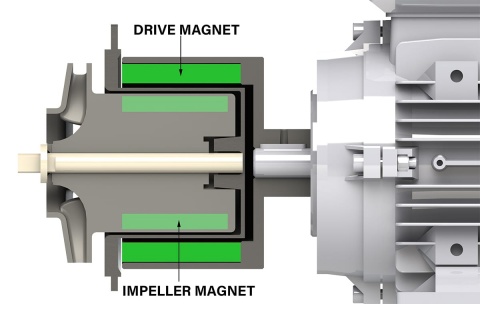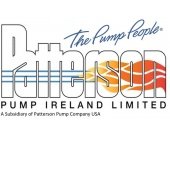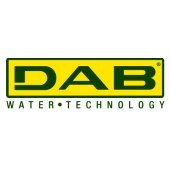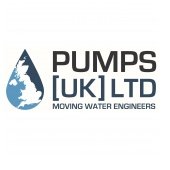WHY CHOOSE A MAGNETIC DRIVE PUMP?
 Liquids that are corrosive, explosive, flammable, toxic, ultrapure or expensive require a pumping solution that offers complete containment. Pump specialist, March May, outlines some of the features and advantages of sealless magnetic drive pumps, which are particularly suited to these applications.
Liquids that are corrosive, explosive, flammable, toxic, ultrapure or expensive require a pumping solution that offers complete containment. Pump specialist, March May, outlines some of the features and advantages of sealless magnetic drive pumps, which are particularly suited to these applications.
With a magnetic drive or mag-drive pump, instead of a shaft that passes through the body of the pump, which requires a dynamic seal, the pump has one assembly of external magnets attached to the shaft of the motor and a second assembly of internal magnets attached to the impeller inside the pump body. When the motor rotates, the magnetic field generated between the two magnets means that the impeller turns in the pump body. Therefore, the liquid to be pumped is contained within the hermetically sealed pump housing without the risk of any leaks from the shaft seal. This means that there is no direct or indirect path through which any fluids or gases can escape and pose a risk to operators and the environment.
The term magnetic drive applies to the coupling mechanism and the nature of construction, so magnetic drive options are not just restricted to centrifugal pumps, but can be gear pumps, rotary vane pumps or screw pumps, for example.
Available in close-coupled and long-coupled (base frame mounted) configurations, mag-drive pumps are made from many different metallic and non-metallic materials, giving a wide choice for excellent chemical compatibility and scope to handle these difficult liquids. They can be configured for applications with low and high temperatures and high system pressures and are available with ATEX certification, a self-priming ability, and with air motor drives.
In close-coupled design systems, many mag-drive pumps offer a back pull-out design allowing pipework and the associated pumped fluid to be kept in-situ. This allows the motor to be easily removed for maintenance without draining down the system.
In addition to the low risk of fluid emissions, mag-drive pumps offer several other advantages. The lack of seals means less maintenance and no requirement for potentially expensive seal support systems. The magnetic coupling means the motor should not be damaged if the pump is jammed and motor alignment issues are eliminated. While together, these advantages can lower the total cost of ownership of the pumping solution. Indeed, this should be assessed when specifying a pumping solution, as the initial cost of the pumping system is typically a relatively small proportion of the total lifecycle cost.
There are other factors to take into consideration, however. Mag-drive pumps are generally not suited to liquids with solids or metallic particles in suspension, and they can be damaged if operated incorrectly. They also have a limited torque transmission capacity due to the strength of their magnets and typically require higher motor power than mechanically sealed pumps for the same duty. Plus, they will have minimum flow requirements; a stable minimum flow rate to ensure the pump operates reliably, and a thermal minimum flow rate to ensure heat generated in the driven magnet/bearing section is dissipated.
An important factor with mag-drive pumps is to monitor for evidence that the pump is running dry. This is when the impeller/gear/ rotor of a pump rotates without any lubrication between it and the shaft that it runs on. A lack of lubrication results in excessive heat being generated on the surfaces of the mating bearing sections. This heat will damage the shaft and the bearing element and will eventually cause the pump to seize and fail.
However, as science and technology progress, modern material options are continuously evolving and improving the life span of mag-drive pumps. The latest sleeve bearings offer very low coefficients of friction.
CONCLUSION
It is important to understand that mag-drive pumps are not a cure for all difficult liquid applications. Improper selection will cause more problems than they were intended to solve and will cost a plant dearly. But there are many applications where a mag-drive pump offers significant benefits. Pump users are advised to use the technical expertise of the pump manufacturers and their appointed sales distributors. 
Back to Latest News
1.png&w=170&h=170)


3.png&w=170&h=170)



2.jpg&w=170&h=170)



